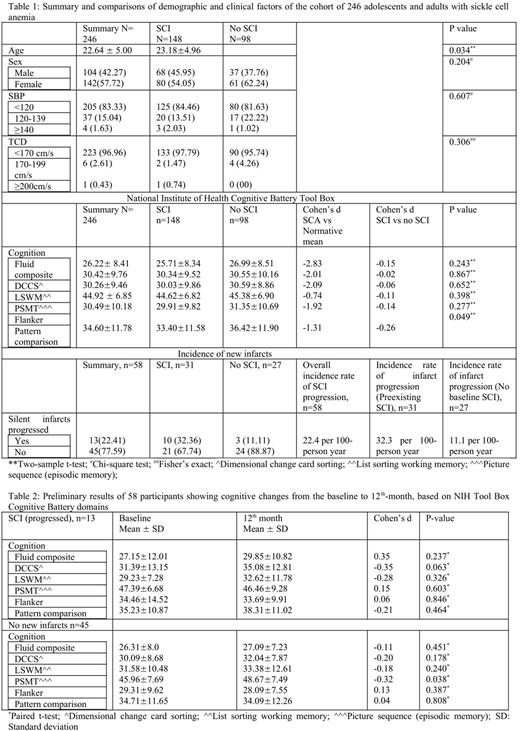Abstract
Introduction Neurological injuries affect children and adults with sickle cell disease (SCD). Previous multiple meta-analyses have demonstrated children with silent cerebral infarcts (SCI) have a full-scale intelligence quotient (IQ) decline of 5 points when compared to children without SCI; however, only a few adult studies have evaluated the correlation between SCI and cognitive impairment. In these small adult studies, the association between SCI and cognitive impairment has been far less well documented, if at all. Further, in children, our group and others have demonstrated that preexisting SCI is associated with a risk of future overt stroke and SCI; however, in adults, there is limited data to demonstrate that SCI predicts infarct recurrence.
To test the hypotheses that: 1) SCI is associated with cognitive impairment in adults with sickle cell anemia (SCA); and 2) SCI is associated with infarct recurrence, we established one of the largest longitudinal cohorts of adults with SCA (Stroke Prevention in the Young Adults [SPIYA], NCT04808778).
Methods We conducted cross-sectional and longitudinal cohort studies involving 246 young adults (16-36 years) with sickle cell anemia (SCA- referred to as HbSS/SßThal0). All participants had a baseline neurological examination, MRI and MRA, non-imaging transcranial Doppler (TCD), and cognitive function assessments with NIH Toolbox Cognition Battery (normative mean = 50 and standard deviation = 10). The cohort was screened for adults and SCA stroke risk factors at baseline and would have an annual brain, heart, and kidney function assessments for 3 years. Participants with incident stroke or baseline SCI were started on hydroxyurea 20mg/kg as standard care and followed monthly, with repeat MRI/MRA, TCD, and cognitive battery annually. Three Nigerian radiologists certified to have 95% agreement with the Silent Cerebral Infarcts Transfusion Trial's (SIT) MRI readings of the neuroradiologists, adjudicated the study's MRI/MRA for SCI and other brain abnormalities. We used SIT trial definition of SCI (≥3mm in diameter of hyper-intense lesion on both axial and coronal sections of T2-weighted FLAIR ≥1.5T MRI, in the absence of clinically detected neurological deficit). The data were analyzed using a two-sample t-test, paired t-test, Chi-square, and Fisher's exact tests. We calculated Cohen's d (effect size) for the mean cognitive differences. Cohen's d effect is considered large if it is ≥0.8.
Results We approached 269 individuals and 268 accepted to be in the study (99.6%). Eighteen (6.7%) were excluded based on eligibility criteria, whereas 250 were enrolled (92.9%). Four participants were dropped (non-HbSS/SßThal on HPLC), making the final sample 246. One participant had abnormal TCD (0.4%); six had conditional (2.6%), out of 93.5% (230 of 246) with an acoustic window opened.
The prevalence of SCI was 59.6% (147 of 246), and the participants with SCI were older (p=.034). Out of 58 participants who completed a 12-month follow-up, 13 (10 with SCI and 3 without SCI at baseline) had infarct progression (new infarct or increasing size of an existing infarct) with an incidence rate among those with and without pre-existing SCI of 32.3 and 11.1 per 100-person year, respectively (Table 1). Compared to the normative mean, adults with and without SCI had significant cognitive impairment translating from as low as <1st to 23rd percentiles. The cognitive impairment was not significantly different with or without SCI. Preliminary analysis of the 58 participants who completed the 12-month assessment suggests new SCI was not associated with a further decline in cognition, Table 2.
Conclusion Regardless of SCI status, adults with SCA have profound cognitive impairment ranging from the 23rd percentile to <1st percentile as per NIH Tool Box Cognitive Battery assessment. Unlike in children, in young adults SCI is not associated with cognitive impairment. Most likely, the absence of cognitive decline associated with SCI is related to the overall low cognitive scores in adults with SCA (floor effect). Further research is required to determine the pathophysiology of severe cognitive deficits in young adults with SCA.
Disclosures
Idris:Agios pharmaceuticals: Consultancy. King:Global Blood Therapeutics: Consultancy, Research Funding. DeBaun:Novartis, GBT, Vertex, and Forma Pharmaceutical: Consultancy, Research Funding.
Author notes
Asterisk with author names denotes non-ASH members.


This feature is available to Subscribers Only
Sign In or Create an Account Close Modal